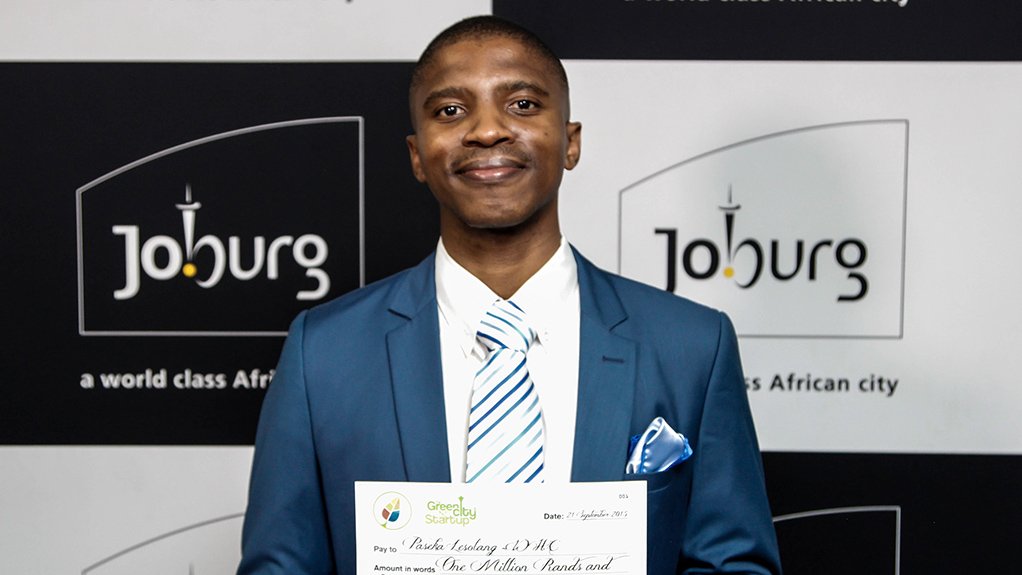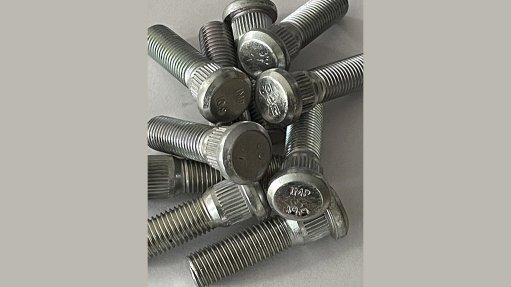Innovator wins R1-million for leak-detecting valve


PASEKA LESOLANG A single leaking toilet can cause a loss of between 30 ℓ and 700 ℓ of water daily
Water-savings solutions company Water Hygiene Convenience (WHC) CEO Paseka Lesolang won first prize in the City of Johannesburg’s Green City Startup Awards, in September, comprising R1-million for his innovation, the Leak-Less Valve.
The WHC Leak-Less Valve acts as a leak detector, preventing up to 70% of water loss from a leaking toilet.
The valve is placed in the toilet cistern and locks at a predetermined level after each flush, prohibiting excess influx of water and stopping water flow in the instance of a leak. As a result, only a maximum of one cistern of water will be lost when a WHC Leak-Less Valve is used, which is thus an indicator that the cistern is leaking.
Moreover, the valve comes with a unique washer that further helps to save water, says Lesolang, adding that fixing leaks can save homeowners more than 10% on their water bills, subject to the water tariff.
He tells Engineering News that WHC is conducting a sales drive before the company begins manu- facturing the valves on a larger scale.
Having been sponsored by an anonymous JSE-listed company, WHC has bought injection moulding machines and is now calculating market demand for the WHC Leak-Less Valve before it finalises the manufacturing mould that it will use.
Lesolang notes that, as a new company, WHC is eligible to outsource the manufacturing of the WHC Leak-Less Valve for the first 1 000 to 100 000 units, after which WHC will have to use its own facilities.
Green City Startup
The Green City Startup initiative is a competition that was launched in December 2014, which aims to provide exposure for creative green entrepreneurs whose ideas could help boost Johannesburg’s green culture and accelerate innovation in the city.
This initiative, which was established by the City of Johannesburg, in partnership with the University of Johannesburg and technology commercialisation incubator Resolution Circle, was sponsored by the Green Challenge Fund.
Eighty-six proposals were reduced to eight finalists, who each received R250 000 to build a prototype of their idea and were offered in-depth technical support to improve their ideas and help them present their pitches.
These finalists presented their prototypes and business to a panel of judges, including an independent team of entrepreneurs and technical experts in September.
Lesolang’s Story
In 2007, Lesolang was in his grandparent’s house in Ga-Rankuwa, Gauteng, and became aware of – and annoyed by – a constant hissing sound coming from their toilet.
After researching the problem, Lesolang discovered that the hissing sound was caused by an extreme toilet leak. He conducted a simple test by placing food colouring in the toilet cistern and observed that, without flushing, the water in the bowl very quickly changed colour.
Lesolang states that South Africa loses R7.2-billion of water a year, owing to leaks.
“I learned that a single leaking toilet [results in] a loss of between 30 ℓ and 700 ℓ of water daily, and I began to realise the implications of this for the country, which is already [experiencing]water scarcity.”
As a result, he sketched the WHC Leak-Less Valve as a solution to the problem.
Lesolang approached several toilet manufacturers with the solution, but was turned away because he was not a qualified engineer. After being interviewed on a national radio station, he received phone calls from interested parties, including one from Botswana.
The widespread interest motivated Lesolang to use his commerce qualification to begin WHC, with the WHC Leak-Less Valve as the company’s benchmark product.
Having been shortlisted as a finalist in the Green City Startup competition, the initiative provided sufficient funding for Lesolang to develop a few prototypes of the WHC Leak-Less Valve and set up pilot projects in Alexandra and Marlboro, in Gauteng.
Ultrasonic meters were placed in the cisterns to measure and compare the water loss of the toilets in which the WHC Leak-Less Valves were installed, as well as those that did not have them installed.
“The results were more extreme than I expected – 21 000 ℓ/m of water was lost . . . ” exclaims Lesolang.
He tells Engineering News that he is extremely grateful for the leverage that the Green City Startup has given WHC.
In addition, Lesolang lauds the confidence shown in the WHC Leak-Less Valve by the City of Johannesburg, The Innovation Hub, the Technology Innovation Agency and law firm Adams & Adams.
The WHC Leak-Less Valve is also being taken seriously by the Department of Water and Sanitation (DWS) as a preventive measure to address water leaks, adding that the department regards the valve as a future township innovation for the War on Water Leaks programme.
The DWS has shortlisted the WHC Leak-Less Valve among nine other water-saving innovations for the future; it has also taken WHC to the National Sanitation Indaba, mentioned WHC in the Budget Vote speech this year and coupled WHC with the Water Research Commission for future piloting, Lesolang recounts.
One of the DWS’s top priorities is dealing with water scarcity and, together with the World Health Organisation, it has calculated that South Africa’s water consumption might exceed availability of supply by 2025.
Lesolang warns that, in the same way that the looming energy crisis was ignored ten years ago, South Africa could be confronted with a water scarcity crisis if immediate action is not taken.
Article Enquiry
Email Article
Save Article
Feedback
To advertise email advertising@creamermedia.co.za or click here
Announcements
What's On
Subscribe to improve your user experience...
Option 1 (equivalent of R125 a month):
Receive a weekly copy of Creamer Media's Engineering News & Mining Weekly magazine
(print copy for those in South Africa and e-magazine for those outside of South Africa)
Receive daily email newsletters
Access to full search results
Access archive of magazine back copies
Access to Projects in Progress
Access to ONE Research Report of your choice in PDF format
Option 2 (equivalent of R375 a month):
All benefits from Option 1
PLUS
Access to Creamer Media's Research Channel Africa for ALL Research Reports, in PDF format, on various industrial and mining sectors
including Electricity; Water; Energy Transition; Hydrogen; Roads, Rail and Ports; Coal; Gold; Platinum; Battery Metals; etc.
Already a subscriber?
Forgotten your password?
Receive weekly copy of Creamer Media's Engineering News & Mining Weekly magazine (print copy for those in South Africa and e-magazine for those outside of South Africa)
➕
Recieve daily email newsletters
➕
Access to full search results
➕
Access archive of magazine back copies
➕
Access to Projects in Progress
➕
Access to ONE Research Report of your choice in PDF format
RESEARCH CHANNEL AFRICA
R4500 (equivalent of R375 a month)
SUBSCRIBEAll benefits from Option 1
➕
Access to Creamer Media's Research Channel Africa for ALL Research Reports on various industrial and mining sectors, in PDF format, including on:
Electricity
➕
Water
➕
Energy Transition
➕
Hydrogen
➕
Roads, Rail and Ports
➕
Coal
➕
Gold
➕
Platinum
➕
Battery Metals
➕
etc.
Receive all benefits from Option 1 or Option 2 delivered to numerous people at your company
➕
Multiple User names and Passwords for simultaneous log-ins
➕
Intranet integration access to all in your organisation


















